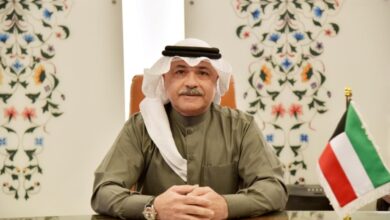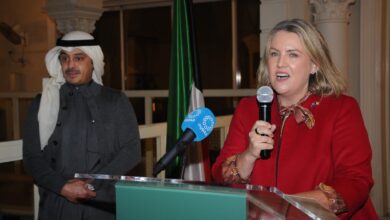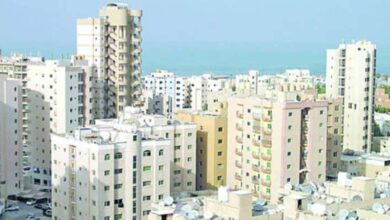Restoring public confidence vital to drive growth

THE TIMES KUWAIT REPORT
Ahead of snap general elections scheduled for 4 April and the subsequent swearing-in of a new parliament, the government is initiating several plans and policies aimed at revving up the economy, improving the investment climate, enhancing social and financial support to citizens, and addressing drawbacks in various spheres.
Underlining these efforts, His HIghness the Prime Minister Sheikh Dr. Muhammad Sabah Al-Salem Al-Sabah said last week that the government’s efforts are focused on improving the financial aspects and living conditions of citizens, and equally importantly, on restoring confidence in the mindset of Kuwaitis so that they would be reassured of the government’s continued focus on their welfare.
Addressing media representatives on the sidelines of a ceremony held at the Saud Nasser Al Sabah Diplomatic Institute to honor a new batch of diplomats, the premier stressed that the state is keen to address all concerns of citizens and ensure their social and economic welfare. He added that the government remained committed to combating all forms of imbalances, including corruption, forgery and crime, and to working with parliament to push forward the country’s development.
A sign of the government’s keenness to enhance investment and pursue the development process was revealed in a recent report by the National Observatory for Sustainable Development and Future Foresight, of the General Secretariat of the Supreme Council for Planning and Development. The report called for a new national strategy to develop the investment system and drive economic growth.
The national strategy would seek to introduce regulatory frameworks that encourage entrepreneurship and investment, provide protection to investors, create attractive initiatives for investment, implement procedures that motivate investors to participate effectively, and achieve economic sustainability in various investment sectors.
Other recommendations in the report aim to diversify revenue sources and widen the production base of the economy; develop training and introduce professional development methods to address skill and experience gaps, and thereby enhance national capabilities and competencies, as well as improve performance of the financial sector to enhance economic growth rates.
The report also urged relevant authorities to create protection initiatives for all segments of society, so as to achieve a decent life and improve the standard of living, and to enforce the rule of law equally on all. As the premier stated recently, “we have a leadership that believes in applying the law to the strong before the weak, and we saw this in the file of combating corruption in its financial and administrative aspects.”
However, the dissolution of parliament in mid-February and the announcement of snap general elections put on hold implementation of several policies and key legislative work, including approval of the government’s draft budget. The current fiscal year 2023/24 (FY23/24) ends on 31 March, and a speedy parliamentary approval of the budget is crucial to ensure effective functioning of public entities, and implementation of major development projects.
Spending on capex projects in particular is vital to improve the country’s infrastructure and drive economic development. However, capital-intensive projects have often been a low priority item for authorities in the past. Going by the government’s draft budget for FY24/25, from 1 April 2024 to 31 March 2025, this appears to be the case even now — the draft budget unveiled in late January. shows yet another fall in capex spending.
A look at the proposed FY24/25 budget shows revenues amounting to KD18.7 billion, and expenses totalling KD24. 6 billion, resulting in a budget deficit of KD5.9 billion. The fact that nine out of ten previous fiscal years have seen a budget deficit underlines the ongoing challenge in securing the country’s long-term fiscal sustainability. A salient feature of the draft budget is that all three aspects — revenues, expenditures, and deficit — are lower than in the ongoing fiscal year.
Fall in revenues relative to FY23/24 can be attributed to the budget’s traditionally conservative estimate of oil prices at US$70 per barrel, which is well below prevailing prices. Another factor is the fall in average annual oil production — from 2.68 million barrels per day (mb/d) in the last fiscal to 2.55 mb/d this year — in line with production cuts mandated by the Organization of Petroleum Exporting Countries (OPEC) and its allies. Average oil production could fall further if OPEC+ extends production cuts beyond the second quarter of 2024.
On the expenditure side, the 6.6 percent lower spending projected in the draft budget from that in FY23/24, is largely due to the absence of one-off expenditures incurred in the previous budget to settle subsidies owed to several public entities. Although spending on all items have been reduced in the new budget, two continue to stand out glaringly — the dominance of wages and subsidies, and the persistent decline in capex spending.
The wages and subsidies bills have risen steadily in recent years, and are now close to 80 percent of all expenditures, with wages alone accounting for 60.4 percent of expenses. In the face of continued reluctance by parliament to approve the draft public debt bill that would allow the government to borrow on the international debt market, the projected deficit in the draft budget is expected to add pressure on the country’s liquid reserves going forward.
On the other hand, the 7.7 percent cut in capex from the last fiscal, and the continued cut in capex spendings in the previous two budgets reflects the dilemma that finance ministers continue to face. The ministers have the unenviable task of juggling a budget in which the main revenue source, oil income, and main expenditure, the wage bill, are items over which they have little or no say.
Considering that the only major expense over which ministers have any sway is in capex spending, it is only to be expected that capex gets slashed every time the government needs to keep expenses in check. It needs to be added that despite cutting spending on capital projects, the government is keen to fund vital infrastructure projects through off-budget funding processes such as foreign investments and through public-private partnerships.
In July 2023, the government also tasked the Ministry of Finance to study plans for a new ‘Ciyada’ (sovereign) development fund dedicated to spearheading domestic investments aimed at fueling economic diversification and development. However, details on this off-budget ‘Ciyada’ fund still remain nebulous, with no indication to date of the value of the funds the Ciyada would control, or any mention of the specific projects it would fund.
Unless political stability ensues following upcoming elections, it is highly probable that policy- and decision-makers in ministries and other public sector entities will be unable, and unwilling, to make the necessary decisions required to move forward major tenders and award contracts any time soon, once again pushing project activities into limbo.
With the reins of leadership passing on to His Highness the Amir, Sheikh Mishal Al-Ahmad Al-Sabah in December of last year, and the swearing-in of a new cabinet headed by His Highness the Prime Minister Sheikh Dr. Muhammad Sabah Al-Salem, expectations were high for a new chapter to be opened in the country’s political, economic and social milieu. However, these hopes ran aground in February when parliament was dissolved over remarks and actions by some legislators.
Rapprochement and a collaborative environment in parliament are critical to moving the wheels of development forward. By now it should be clear to everyone involved that the country cannot afford yet another long period of political instability and economic doldrums.



























